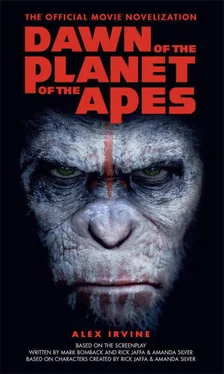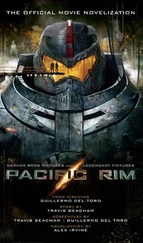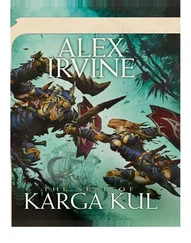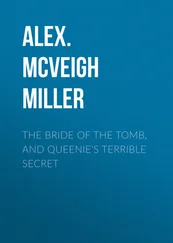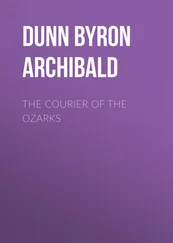Alex Irvine - Dawn of the Planet of the Apes
Здесь есть возможность читать онлайн «Alex Irvine - Dawn of the Planet of the Apes» весь текст электронной книги совершенно бесплатно (целиком полную версию без сокращений). В некоторых случаях можно слушать аудио, скачать через торрент в формате fb2 и присутствует краткое содержание. Город: London, Год выпуска: 2014, ISBN: 2014, Издательство: Titan Books, Жанр: Фантастика и фэнтези, на английском языке. Описание произведения, (предисловие) а так же отзывы посетителей доступны на портале библиотеки ЛибКат.
- Название:Dawn of the Planet of the Apes
- Автор:
- Издательство:Titan Books
- Жанр:
- Год:2014
- Город:London
- ISBN:978-1783292271
- Рейтинг книги:5 / 5. Голосов: 1
-
Избранное:Добавить в избранное
- Отзывы:
-
Ваша оценка:
- 100
- 1
- 2
- 3
- 4
- 5
Dawn of the Planet of the Apes: краткое содержание, описание и аннотация
Предлагаем к чтению аннотацию, описание, краткое содержание или предисловие (зависит от того, что написал сам автор книги «Dawn of the Planet of the Apes»). Если вы не нашли необходимую информацию о книге — напишите в комментариях, мы постараемся отыскать её.
Dawn of the Planet of the Apes — читать онлайн бесплатно полную книгу (весь текст) целиком
Ниже представлен текст книги, разбитый по страницам. Система сохранения места последней прочитанной страницы, позволяет с удобством читать онлайн бесплатно книгу «Dawn of the Planet of the Apes», без необходимости каждый раз заново искать на чём Вы остановились. Поставьте закладку, и сможете в любой момент перейти на страницу, на которой закончили чтение.
Интервал:
Закладка:
Dreyfus’s back stung from the number of times it had been slapped. His hands were scraped and aching from being shaken by what seemed like a thousand people. Finally he excused himself from the festivities, because there was something he needed back in his quarters.
It took him a while to find it, buried under a pile of maps on a shelf in the corner, but before long he was standing in front of an electrical outlet, an iPad in one hand and its power plug in the other. Moving with the care of a priest performing a mystic ritual, he plugged it in and closed his eyes when he saw the lightning bolt on its screen.
He watched it, hearing the joyful sounds outside but caring only for the tiny sliver of red that appeared on the battery icon. The tablet powered up, and Dreyfus tapped the photo icon. He swiped through photos of old Army buddies, fellow police officers, him at different social functions and fund-raisers… and there was what he had come for. Maddy and their boys, Edward and John. Standing on the viewing platform at the top of the Coit Tower, they smiled for the camera in that distant year of 2012, when the Simian Flu was just a public-health concern and nobody had imagined what the next ten years would hold. Dreyfus blinked tears from his eyes and looked, drinking in every last detail.
Electricity wouldn’t just give them a future, he thought. It would give them back their past. He looked up and out his window, over the mass of revelers. Above them, blinking against the sky, was the light at the top of the antenna on the unfinished skyscraper. If the light was on, the antenna had power. If the antenna had power, they could make themselves known, and at last—at long last—they could hear other human voices.
If any were left.
He took another look at his family, kissed his fingers and touched them to each of the three faces in turn. Then he set the tablet on his desk and composed himself. It was time to be the leader again.
The radio room was set back in a corner of the Colony away from the market and near the edge of the workshop area. Dreyfus headed for it, enduring more backslaps and handshakes, smiling and high-fiving, and at last getting clear of the crowd. He entered the radio room, and the first thing that struck him was the sound.
Static.
Two men, Finney and Werner, were working with the transceiver. They sat at a table piled high with a wall of recovered equipment. They had everything from military-grade amplifiers to CB radios scavenged from old trucks. Those had taken some searching. In the age of the Internet, the CB had been almost as dead as the eight-track tape. But they had them. And they had everything else they could find that might send or receive a signal, all wired through stacks of drum-shaped signal boosters that gave them a broadcast range of hundreds of miles… in theory, anyway, and depending on the fog and atmospheric conditions…
Werner leaned into a microphone, headphones on, speaking over the thrum of current from the boosters.
“This is San Francisco, attempting contact. If anyone is receiving this message, we ask that you identify yourself and your location, over…” He noticed Dreyfus and nodded at the mountain of gear, proud of what they had done. “We’re out on over two hundred frequencies now.”
Dreyfus nodded. They all watched the speakers, looked from dial to dial on the dozens of sets piled together on the table. The static was broken by a sharp crackle and they all froze, listening harder. Had there been a hint of a voice?
The crackle lasted only a second. Then the static returned.
“Keep trying,” Dreyfus said. Hell, static was a big step forward.
49
Koba and his army thundered over the bridge, not caring who knew they were coming. They were too many for the few humans in the fort, and once the apes were in the fort, the rest of the humans would be no match for them.
Carrying torches, they rolled through the fog, down the swooping ramp from the bridge to the road that ran past the brick building. They spilled through the open gate and headed to the firing range. Koba did not care what happened to whatever humans were there. If his apes killed them, fine. If not, it would not matter once they had the guns and they marched on the human settlement. There would be plenty of time to hunt down survivors.
What he wanted right then was a gun in the hand of every ape.
He and Grey and Stone rode past steel vehicles, some with wheels and some with metal tracks. Apes did not know how to use those, so he ignored them. They pushed through the firing range and Koba dismounted, leading his group into the warehouse. He glanced at a corner of the building, where the two humans he had deceived were folded into a pair of weapon crates. He had killed three more today, and the night would bring many more.
The apes stood gawking at the three levels of the warehouse, each stacked with endless crates of guns. They grunted and growled, keeping their voices low only because Koba had commanded it. He wanted them pent-up and boiling when the attack on the human settlement started.
At a gesture from him, apes scaled the walls and started breaking open crates. They formed chains, handing rifles down in armloads. Most of them were rifles like the one slung over Koba’s back, but there were others, too. Some were shorter, with longer bullet boxes. Some were three times the size of a rifle, with hundreds of bullets in a long string. All of them went into ape hands as Stone moved among them with a pouch, dabbing war paint from it onto their faces. They looked at their weapons, eyes gleaming, rocking from foot to foot with the desire to hunt, to fight, to kill.
Koba saw Maurice and Rocket just inside the doorway. Of all the apes, only they seemed reluctant. He would keep an eye on them. They would submit. Apes together strong. He picked out Blue Eyes, watching the endless number of guns appearing from the darkened upper floors, and went to him. On the way he took a rifle from another ape. He thrust it in front of Blue Eyes, who looked down at it for a moment. Then he looked at Koba. Koba nodded.
Blue Eyes took the rifle, his face hardening.
Near them on the floor was a box full of bottles. Koba remembered the taste of the whiskey. He picked up one of the bottles and was about to drink when the inside of the warehouse lit up with muzzle flashes and the deafening sound of a heavy gun. One of the apes, careless, had accidentally fired many bullets up into the ceiling. Looking up, they could see the holes because beyond the roof, the fog was aglow with light.
Koba looked at his apes. They now saw what they held in their hands. For the space of a deep breath there was perfect silence in the warehouse.
Then it exploded with screeching and more shots as the ape army began to build itself into a new frenzy. Koba could not have stopped it if he’d wanted to… but he did not want to. Let them screech. Let them fire. Let the sound terrify any human who could hear it. He stood with Blue Eyes, letting the apes see them together, basking in the rising thunder of their hate, letting it grow to match his own.
Rocket and Maurice had no guns. Koba did not say anything, but he noticed. Yes, even with one eye, he noticed.
50
In the radio room, Werner was still broadcasting. He was tireless. Since the power had come back on, he’d been glued to the chair, repeating the same message, over and over.
“This is San Francisco, attempting to establish contact. If you are receiving this signal, please respond. Repeat, this is San Francisco—”
The door banged open and a rush of celebratory noise flooded in. Werner broke off, and Dreyfus looked up from pacing back and forth to see one of his officers, Dan DeRosario, gasping for breath in the doorway. Dreyfus had seen a lot of fear in the last ten years, but DeRosario was as scared as any human being he’d ever seen.
Читать дальшеИнтервал:
Закладка:
Похожие книги на «Dawn of the Planet of the Apes»
Представляем Вашему вниманию похожие книги на «Dawn of the Planet of the Apes» списком для выбора. Мы отобрали схожую по названию и смыслу литературу в надежде предоставить читателям больше вариантов отыскать новые, интересные, ещё непрочитанные произведения.
Обсуждение, отзывы о книге «Dawn of the Planet of the Apes» и просто собственные мнения читателей. Оставьте ваши комментарии, напишите, что Вы думаете о произведении, его смысле или главных героях. Укажите что конкретно понравилось, а что нет, и почему Вы так считаете.
